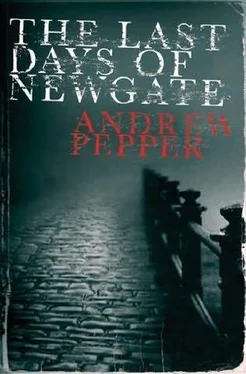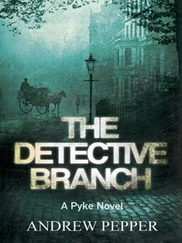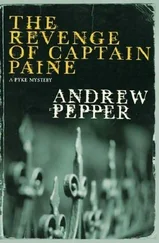Andrew Pepper - The Last Days of Newgate
Здесь есть возможность читать онлайн «Andrew Pepper - The Last Days of Newgate» весь текст электронной книги совершенно бесплатно (целиком полную версию без сокращений). В некоторых случаях можно слушать аудио, скачать через торрент в формате fb2 и присутствует краткое содержание. Жанр: Исторический детектив, на английском языке. Описание произведения, (предисловие) а так же отзывы посетителей доступны на портале библиотеки ЛибКат.
- Название:The Last Days of Newgate
- Автор:
- Жанр:
- Год:неизвестен
- ISBN:нет данных
- Рейтинг книги:4 / 5. Голосов: 1
-
Избранное:Добавить в избранное
- Отзывы:
-
Ваша оценка:
- 80
- 1
- 2
- 3
- 4
- 5
The Last Days of Newgate: краткое содержание, описание и аннотация
Предлагаем к чтению аннотацию, описание, краткое содержание или предисловие (зависит от того, что написал сам автор книги «The Last Days of Newgate»). Если вы не нашли необходимую информацию о книге — напишите в комментариях, мы постараемся отыскать её.
The Last Days of Newgate — читать онлайн бесплатно полную книгу (весь текст) целиком
Ниже представлен текст книги, разбитый по страницам. Система сохранения места последней прочитанной страницы, позволяет с удобством читать онлайн бесплатно книгу «The Last Days of Newgate», без необходимости каждый раз заново искать на чём Вы остановились. Поставьте закладку, и сможете в любой момент перейти на страницу, на которой закончили чтение.
Интервал:
Закладка:
This time, Jo could not bring herself to look at him. ‘I just want what is best for my mistress.’ She fidgeted, shifting her body weight awkwardly from foot to foot.
‘But I have yet another reason to be grateful to you in particular.’
This time Jo neither answered him nor even looked at him. He approached her, smiling.
‘Do you know what I’m referring to?’
‘No.’
‘The occasion you warned me about the assault in the Blue Dog tavern.’ As Jo tried to leave, he grabbed her wrist. ‘Well?’
She stared at him like a trapped rabbit but managed to mutter, ‘I don’t know what you mean.’
‘You shouted my name. I presume to warn me.’ He tightened his hold on her wrist. ‘But I cannot for the life of me work out why you might have been following me in the first place.’
‘I have never even been to that place.’ She grimaced, struggling in vain to free herself from Pyke’s grip.
‘You concealed your face well under the bonnet. But it was your voice that gave you away.’
‘I’m afraid you’re mistaken, sir.’
‘Am I?’ Pyke let go of her wrist, aware that he had perhaps bruised her, and watched as she gathered up her skirt and hurried from the church.
TWENTY-THREE
Sir Richard Fox disembarked from his private carriage and was hurrying towards the entrance to number five Bow Street when Pyke caught up with him. Pyke was dressed as a beggar and Fox did not recognise him until he said, ‘Don’t look at me, Sir Richard. Just keep on walking, as though you have somewhere else to go.’
Rigid as a washboard, Fox did as he was told. Though Pyke could not be certain, it struck him that Fox may have been frightened.
Thirty yards past the Bow Street offices, they came to a halt. Pyke looked around, to make sure that no one had followed them. The street was thronging with the usual traffic of carriages, carts and traders.
‘The addresses,’ he said, not bothering with any formalities.
Fox looked around him, as though searching for assistance. ‘I told you yesterday, Pyke. Vines is away at the moment.’
‘His address.’
‘It’s somewhere in the office, if you want to come in with me and wait. .’ He smoothed his moustache.
‘Tilling’s, then.’
‘Ah, yes, I managed to find that one for you.’ He reached into his jacket, pulled out his wallet, removed a scrap of paper and thrust it into Pyke’s outstretched hand.
Pyke read what was on the scrap, stuffed it into his own pocket and said, ‘I’ll be back for Vines’s address.’
Pyke was already five yards along the street, disappearing into the crowd, when he heard Fox shout, ‘Pyke.’
It was an innocent mistake, or so Pyke believed — uttering the name of an old friend or acquaintance, as one might do under normal circumstances. But its consequences were startling. At first, other passers-by seemed not to have heard Fox’s mistake, or at least did not outwardly respond to it. Pyke pulled the cap down over his face and walked briskly in the direction of Covent Garden market, trying not to draw attention to himself. But after a few moments, the impact of this public utterance of his name percolated into the minds of those who had heard it, a few looked at him and finally one shouted, ‘That’s Pyke.’ The effect of these words was astonishing. Perhaps it was simply the reward money: five hundred pounds was a monumental, almost unheard-of, sum, and suddenly everyone on Bow Street could taste a share of it. Another voice shouted, ‘That’s Pyke, that is.’ Still another, ‘Someone stop ’im.’ It was possible his name electrified those who heard it for different reasons: some may have been afraid, others wanted to see him hang. In the end, the effect was the same: suddenly he was a marked man and others joined the hunt. ‘Is that ’im?’ one asked. Another said, ‘He’s got a pistol.’ Still another said, ‘Just kill him. They’ll pay up for a corpse too.’
Pyke darted into a side street and broke into a run. Doing so may have been a mistake: it unnecessarily drew attention to him. But he could not help it. He needed to put as much distance between himself and his pursuers as possible. That was his ambition, but alerted to his presence by shouts from behind, others were spilling out of dilapidated buildings almost at the same moment as he was passing them. Turning into an even smaller alleyway, he pushed his way past a newsboy. From behind, someone tried to grab his shoulder; he pulled himself free and ducked into a dingy entrance. Shouts followed. It was a pawnshop: there were racks of shawls, petticoats, skirts, stays, gowns, shirt-fronts, handkerchiefs and trousers. Ignoring the owner, he barged his way through the shop, knocking over piles of clothes as he did so. He kicked down the back door, and found himself in a small courtyard, surrounded by buildings. A fighting dog, chained to its kennel, sprang to its feet and growled at him through bared teeth. Pyke took no notice of it and forced his way into another building on the other side of the court. He could still hear voices behind him. This time he found himself in the kitchen of a lodging house: a fire was blazing in the grate, rashers of bacon suspended before it. Around a table sat seven or eight men dressed in working clothes. No one made any effort to block his path. As he left the lodging house, this time by the front entrance, he could not see any sign of his pursuers. Across the alleyway, he entered another lodging house, this one more run down, and pushed his way through to the back of the building, where he found himself in an identical courtyard. This time, however, he hesitated for a moment and looked behind him.
No one seemed to have followed him.
It was dark and quiet in the yard. Above him rain fell lightly out of a desolate sky. Pyke kept moving deeper and deeper into the rookery. If he had stopped to think about it, he might have likened himself to a hunted animal, but such was his fear, and his desire to evade capture, that he did not once pause to consider his predicament. Perhaps his nerves were dulled by the laudanum. In any case, he felt oddly calm by the time he finally came to a halt, in an empty skittle yard attached to a beer shop. At first he just chuckled, but very soon this had mutated into a deep belly-laugh and finally into uncontrolled hysteria. He laughed because he was not yet dead.
From the bay window in Fitzroy Tilling’s front room, the view took in Hampstead Heath and extended far beyond to the sprawling metropolis, which spilled out in every direction. A blanket of fog clung to the city’s smoke-blackened buildings, and the sun was barely visible through the murkiness.
From a cursory inspection, Pyke concluded that it was a masculine environment and, as such, was appropriately anonymous. There were no personal effects in the rooms and few decorative features. The ground floor comprised a front and a back room, in addition to the small — and from what Pyke could tell unused — kitchen in the basement. The rooms were furnished with dingy Turkey carpets and an assortment of old-fashioned tables and chairs. Above the fireplace in the front room sat two old-fashioned silver candlesticks, but otherwise the furnishings were sparse and utilitarian.
Pyke had inserted a thin metal instrument between the sash windows at the back of the house and undone the catch.
While he waited for Tilling to return, he perused the books lining the walls of the back room. He was surprised at the overlap with his own interests, but whereas he was self-educated and could read the works of Machiavelli or Descartes only in translation, Tilling had their original works in Italian and French.
Tilling finally arrived home shortly after seven in the evening. He was dressed in the same jacket and trousers as he had worn the previous time they had met in the basement of Whitehall. Beneath the jacket, his white linen shirt glowed against dark skin. His gaze swept the room, his bug-like eyes pulled close together with worry, as though he sensed that something was amiss even before he spotted Pyke sitting on one of his horsehair chairs in the front room.
Читать дальшеИнтервал:
Закладка:
Похожие книги на «The Last Days of Newgate»
Представляем Вашему вниманию похожие книги на «The Last Days of Newgate» списком для выбора. Мы отобрали схожую по названию и смыслу литературу в надежде предоставить читателям больше вариантов отыскать новые, интересные, ещё непрочитанные произведения.
Обсуждение, отзывы о книге «The Last Days of Newgate» и просто собственные мнения читателей. Оставьте ваши комментарии, напишите, что Вы думаете о произведении, его смысле или главных героях. Укажите что конкретно понравилось, а что нет, и почему Вы так считаете.












